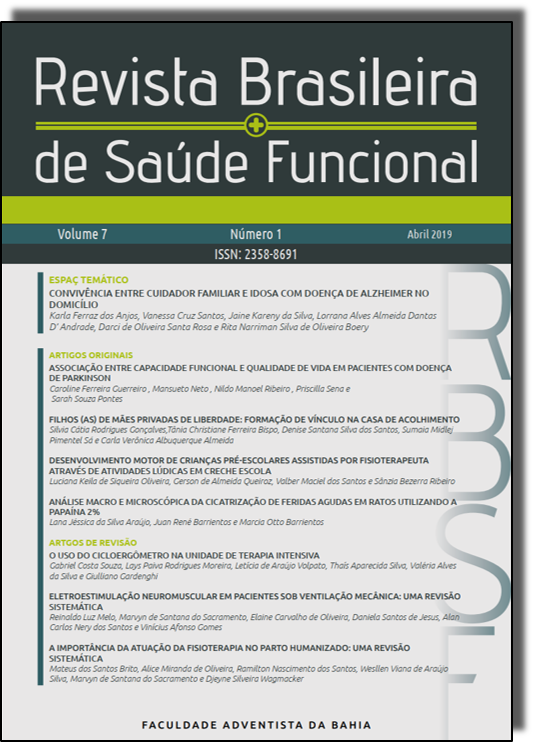FILHOS (AS) DE MÃES PRIVADAS DE LIBERDADE: FORMAÇÃO DE VÍNCULO NA CASA DE ACOLHIMENTO
DOI:
https://doi.org/10.25194/rebrasf.v7i1.1014Palabras clave:
Criança, Institucionalização, Adolescentes, Prisões.Resumen
Introdução: O encarceramento materno pode impactar na vida dos filhos acarretando na mudança do cuidador, da casa, escola, afastamento do convívio familiar, da comunidade e na institucionalização da criança e do adolescente devido ausência de algum familiar que possa assumir a tutela ou guarda. Objetivo: Analisar a vivência de crianças e adolescentes filhos de mães privadas de liberdade em uma casa de acolhimento. Método: Trata-se de uma pesquisa exploratória, descritiva com delineamento qualitativo com crianças e adolescentes de 8 a 18 anos. Os dados foram coletados através da observação participante e de entrevista semi estruturada, analisados de acordo com a análise de conteúdo de Bardin e categorizados, resultando em categorias analíticas. Resultados: Emergiram três categorias analíticas: vínculo afetivo, vínculo familiar e vínculos institucionais. Conclusão: Foi possível identificar que as crianças e adolescentes foram institucionalizados devido à situação de privação de liberdade materna, porém as mães encontram-se em liberdade e as crianças e adolescentes continuam institucionalizados e que, apesar do grande desejo de ficar com as famílias, eles preferem ficar na instituição devido a garantia de moradia, comida, escola, segurança e de um futuro melhor.
Citas
REFERÊNCIAS
BULTMANN, Rudolf. Der Stil der paulinischen Predigt und die kynisch-stoische Diatribe. Gottingen: Vandenhoeck & Ruprecht, 1910.
CARTER, Timothy L. Paul and the Power of Sin: Redefining “Beyond the Pale”. Cam-bridge University Press, 2005.
CRANFIELD, C. E. B. A critical and exegetical commentary on the Epistle to the Romans. London: T&T Clark International, 2004.
DUNN, J. D. G. “Romans 1-8.” Word Biblical Commentary. Dallas: Word, Incorporated, 2002.
FANNING, Buist M. Verbal aspect in New Testament Greek. Oxford: Clarendon Press, 1990.
HILL, Craig C. “Romans”. In: MUDDIMAN, John, BARTON, John. The Pauline Epis-tles. Oxford University Press, 2010, 57-91.
KELLER, Edmund B. Some Paradoxes of Paul. New York: Philosophical Library, 1974.
LAMP, Jeffrey S. “The Rhetoric of Righteousness: An Overview of Pauls Argument in Romans 5-8.” The Asbury Theological Journal, 60 no 2 (2005), p. 55-66.
LEE, Jae Hyun. Paul’s Gospel in Romans: A Discourse Analysis of Rom. 1:16-8:39. Lei-den: Brill, 2010.
LYALL, F. “Roman Law in the Writings of Paul: the Slave and the Freedman”, New Tes-tament Studies, 17 (1970), 73-79.
METZGER, Bruce M. A textual commentary on the Greek New Testament. London, New York: United Bible Societies and United Bible Societies, 1994.
MOFFATT, James. “The interpretation of Romans 6:17-18.” Journal of Biblical Literature, v. 48, n. 3-4 (1929), 233-238.
MORRIS, Leon. The Epistle to the Romans. Grand Rapids, Mich.; Leicester, England: W.B. Eerdmans; Inter-Varsity Press, 1988.
PORTER, Stanley E. “The argument of Romans 5: can a rhetorical question make a differ-ence?” Journal of Biblical Literature, v. 110, n. 4 (1991), 655-677.
RÖHSER, G. Metaphorik und Personifikation der Sünde. Tübingen: J.C.B. Mohr, 1987.
SAMPLEY, J. Paul, Peter Lampe. (Ed.). Paul and Rhetoric. New York: T&T Clark, 2010.
SCHREINER, T. R. “Romans”. Baker exegetical commentary on the New Testament, vol. 6. Grand Rapids, Mich.: Baker Books, 1998.
SHEDD, William G. T. Commentary on Romans. Eugene, OR: Wipf and Stock Publishers, 2001.
STOWES, Stanley K. “The Diatribe”. Em David E. Aune. (Ed.). Greco-Roman Literature and the New Testament: Selected Forms and Genres. Atlanta: Scholars Press, 1988.
________. “Paul’s Dialogue with a Fellow Jew in Romans 3:1-9”. CBQ 46 (1984).
________. “The Diatribe and Pauls Letter to the Romans”. Chico, CA Scholars Press, 1981.
UMBACH, Helmut. In Christus getauft, von der Sünde befreit: die Gemeinde als sündenfreier Raum bei Paulus. Göttingen: Vandenhoeck & Ruprecht, 1999.
VIARD, Jean-Sébastien. “Obéissance ou liberté: Redécouverte structurelle de Rm 6.15-23.” Science et Esprit, 54, n. 3 (2002), 351-366.
________. L`identite chretienne en Romains 6-8: analyse structurelle et narrativite. (Tese doutoral). Universite de Montreal, 2007.
Wallace, Daniel B. The Basics of New Testament Syntax: An Intermediate Greek Grammar. Grand Rapids, Mich: Zondervan, 2009.
WATERS, Larry J. “Paradoxes in the Pauline Epistles.” Bibliotheca Sacra, 167 (2010), p. 423-441.
WHITE, Ellen G. Atos dos Apóstolos. Tatuí, SP: Casa Publicadora Brasileira, 2006.
WITHERINGTON, Ben, Darlene Hyatt. Paul’s letter to the Romans: A Socio-rhetorical Commentary. Grand Rapids, Michigan: W.B. Eerdmans, 2004.


